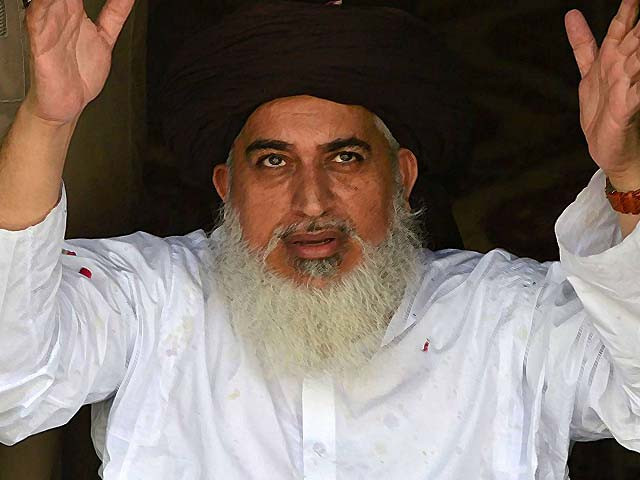The controversial firebrand chief of the Tehreek-e-Labbaik Pakistan (TLP), Khadim Hussain Rizvi, died on November 19, 2020. Rizvi rose to prominence out of ‘nowhere’ in a short period of time, and in the process left a profound mark on Pakistani society, particularly with respect to religious extremism and militancy. While religious extremism is nothing new in Pakistan, what made Rizvi unique was the fact that he inspired a very different kind of extremism within a group which, at least in the popular imagination, is not militant. As rightly pointed out by Nadeem Farooq Paracha, our imagination about Sufism is shaped by pop culture and a generally accepted narrative, according to which followers of Sufism are essentially mild people who sing qawaalis, engage in dhamals, and preach tolerance; whereas in reality Sufism is not monolithic and is a contested domain, and some strains can espouse violence. TLP belongs to the more violent strain of Sufism.
Unlike religious outfits like the Taliban, the TLP is less violent but, in some ways, more dangerous. While it is true that the TLP has never indulged in extreme acts like suicide attacks and bombings, their brand of violence has the potential of becoming far more pervasive and far-reaching as it is something which an ordinary citizen can relate to, appreciate and even espouse. Just recall what happened when Aasia Bibi was acquitted of the blasphemy charges levied against her. For several days, tens of thousands of hardliners indulged in violent protests, bringing large swathes of Pakistan to a standstill. Eventually the government had to strike a deal with them in order to get some respite. Even just before Rizvi’s demise, the TLP again forced the government to strike a deal on its own terms. Compared to the Taliban, whose extremism is not an intrinsic part of the character of our society, Barelvi extremism as practiced by the TLP is increasingly becoming rooted in our cultural ethos and collective mindset. To quote a friend of mine, who also happens to be a writer,
“No such thing as a ‘Taliban mind-set’ exists in mainland Pakistan. It has never existed. Never will. It simply does not go well with the local cultural ethos. The term is a misguided liberal belief. However, there does exist a thing known as ‘Aashiq-e-Rasool’: politicise it a little, provoke it to even a small degree and you will have a burning country on your hands.”
Looking at the pictures and video clips of Rizvi’s funeral at the Minar-e-Pakistan, I can safely say that it was one of the biggest funerals I have seen in my lifetime, rivalling that of Mumtaz Qadri, who ironically was the foremost reason behind Rizvi’s meteoric rise.
It is astounding that literally tens of thousands thronged to the funeral of a person who openly incited violence and hatred against the minorities, weaponised the issue of the finality of Prophet-hood to an extremely violent and dangerous extent, regularly pressurised the state to strike deals on his terms, and used profanities in his speeches. But then again, should we really be surprised? He was popular exactly for the aforementioned reasons, and he connected with a substantial segment of our society on a visceral level.
However, as a political opportunist, Rizvi was simply saying what many wanted to hear. Rizvi did not create the hate, he merely exploited it and, in the process, made it even more virulent, stripped off the political niceties. His ‘contribution’ was to merely articulate it in a cruder and blunter manner, in line with the baser level of sentiments already prevailing in Pakistani society. The rot did not start with him, it was already there. Rizvi was just a logical progression of what had already been happening in this country.
The reality is that ours is an extremist society and almost all the political stakeholders have contributed towards this extremism and exploited it whenever the opportunity arose. One of the weakest arguments I have heard against this sentiment is that Pakistanis do not vote for religious parties and are therefore ‘moderate’. This is a completely baseless claim. Religious parties do not get a major chunk of the votes mainly because other parties also use the religion card while offering other incentives too, thereby leaving religious parties with not much to sell. The so-called ‘moderate’ mainstream parties, namely the PPP, PTI and PML-N, as well as Pakistan’s establishment, have, to varying degrees, weaponised religion whenever it has suited them. In fact, during the electoral campaign in 2018, it seemed at times that there was very little difference between the rhetoric and sloganeering of the TLP and the other two mainstream right-wing parties, PML-N and PTI.
Not only is ours an extremist society, it is also a thoroughly hypocritical one, which cries about Islamophobia in the West while mistreating religious minorities and women in Pakistan. In the global gender gap ranking we are third last, and in the minority rights index we are ninth from the bottom, and yet we have the audacity to cry about Islamophobia in the West. Our prime minister constantly tweets about Islamophobia, and yet he does not have a single word to say when it comes to the way our own minorities are treated.
Rizvi, before his death, was agitating for the expulsion of the French ambassador from Pakistan and for a complete boycott of French products, a demand which an overwhelming number of Pakistanis are also making in light of the French cartoons controversy. However, if the rationale behind boycotting France is religious discrimination and bigotry, then perhaps Pakistan should start by boycotting itself first.



COMMENTS
Comments are moderated and generally will be posted if they are on-topic and not abusive.
For more information, please see our Comments FAQ